The Week in Freethought History (November 18-24)
Here’s your Week in Freethought History: This is more than just a calendar of events or mini-biographies – it’s a reminder that, no matter how isolated and alone we may feel at times, we as freethinkers are neither unique nor alone in the world.
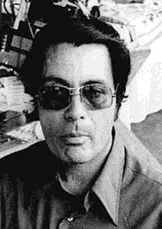 Last Sunday, November 18, but in 1978, over 900 members of the People’s Temple religious cult, along with their leader Jim Jones, committed mass suicide in Jonestown, Guyana, South America. The leader of the cult, Jim Jones, opened his own independent, but non-Fundamentalist Christian church in Indianapolis about 1953, and in 1964, at the height of the American civil rights movement, the Disciples of Christ ordained him. His group of followers called themselves the People’s Temple. Believing a nuclear Armageddon was coming, Jones moved his congregation to the San Francisco Bay Area in 1965. But a 1977 New West magazine article charged Jones with faith-healing fakery, physical abuse of his parishioners and questionable finances. Having already leased some jungle land in Guyana for a “People’s Temple Agricultural Project,” Jones warned his followers his persecutors could end his mission. He ordered a select thousand to accompany him to Jonestown in 1977 and 1978. On 17 November 1978, U.S. Representative Leo Ryan arrived at Jonestown. When some residents tried to leave with Ryan, Ryan, some defectors and some news people, were murdered at the airstrip on orders from Jim Jones. His mission and his place in history slipping away from him, and physically and mentally deteriorating himself, on November 18 Jones ordered his people to commit suicide by drinking cyanide-laced Kool-Aid (hence the expression, “to drink the Kool-Aid”). In all, 914 bodies were found, some murdered, including more than 200 children, along with Jim Jones, age 47, shot through the head. The People’s Temple mass suicide was not unique. As far back as Masada (73 CE) – and as recently as the “Benevolent Mother” cult of South Korean Park Soon-ja (29 August 1987), the Tijuana Mexican Sect (13 December 1990), the Branch Davidians in Waco under David Koresh (19 April 1993), the Order of the Solar Temple (22 March 1997, 23 December 1995, 5 October 1994), and the Heaven’s Gate comet cult (26 March 1997) – otherwise good people have abandoned good sense for a bad promise.
Last Sunday, November 18, but in 1978, over 900 members of the People’s Temple religious cult, along with their leader Jim Jones, committed mass suicide in Jonestown, Guyana, South America. The leader of the cult, Jim Jones, opened his own independent, but non-Fundamentalist Christian church in Indianapolis about 1953, and in 1964, at the height of the American civil rights movement, the Disciples of Christ ordained him. His group of followers called themselves the People’s Temple. Believing a nuclear Armageddon was coming, Jones moved his congregation to the San Francisco Bay Area in 1965. But a 1977 New West magazine article charged Jones with faith-healing fakery, physical abuse of his parishioners and questionable finances. Having already leased some jungle land in Guyana for a “People’s Temple Agricultural Project,” Jones warned his followers his persecutors could end his mission. He ordered a select thousand to accompany him to Jonestown in 1977 and 1978. On 17 November 1978, U.S. Representative Leo Ryan arrived at Jonestown. When some residents tried to leave with Ryan, Ryan, some defectors and some news people, were murdered at the airstrip on orders from Jim Jones. His mission and his place in history slipping away from him, and physically and mentally deteriorating himself, on November 18 Jones ordered his people to commit suicide by drinking cyanide-laced Kool-Aid (hence the expression, “to drink the Kool-Aid”). In all, 914 bodies were found, some murdered, including more than 200 children, along with Jim Jones, age 47, shot through the head. The People’s Temple mass suicide was not unique. As far back as Masada (73 CE) – and as recently as the “Benevolent Mother” cult of South Korean Park Soon-ja (29 August 1987), the Tijuana Mexican Sect (13 December 1990), the Branch Davidians in Waco under David Koresh (19 April 1993), the Order of the Solar Temple (22 March 1997, 23 December 1995, 5 October 1994), and the Heaven’s Gate comet cult (26 March 1997) – otherwise good people have abandoned good sense for a bad promise.
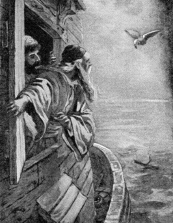 Also last Sunday, but in 2347 BCE, Noah’s Ark came to rest on the mountains of Ararat, after 150 consecutive days of rain. We can be sure that this story is true, because the Judeo-Christian Bible tells us so, the Church Fathers say it was so, the Catholic Encyclopedia confirms it, and up to 75% of Americans believe it. Fortunately for the human race, we do not determine truth by vote. The Flood or Deluge is the means described in Genesis 6-8 by which God destroyed, all the members of the human race except Noah and his family, on account of general human wickedness. There seems to have been no way for the Almighty to save the innocent land species and the people who had never heard of Jehovah, but that’s a minor flaw in the story. The painfully obvious mythical qualities of the biblical Flood story should obviate the energetic apologetics of fundamentalists, such as attempting to prove that the flood was local rather than global, or that looking at the original Hebrew will clear up any confusion. These are easy enough to dismiss: If God had wanted us to know the truth, he wouldn’t have given us badly translated revelations!
Also last Sunday, but in 2347 BCE, Noah’s Ark came to rest on the mountains of Ararat, after 150 consecutive days of rain. We can be sure that this story is true, because the Judeo-Christian Bible tells us so, the Church Fathers say it was so, the Catholic Encyclopedia confirms it, and up to 75% of Americans believe it. Fortunately for the human race, we do not determine truth by vote. The Flood or Deluge is the means described in Genesis 6-8 by which God destroyed, all the members of the human race except Noah and his family, on account of general human wickedness. There seems to have been no way for the Almighty to save the innocent land species and the people who had never heard of Jehovah, but that’s a minor flaw in the story. The painfully obvious mythical qualities of the biblical Flood story should obviate the energetic apologetics of fundamentalists, such as attempting to prove that the flood was local rather than global, or that looking at the original Hebrew will clear up any confusion. These are easy enough to dismiss: If God had wanted us to know the truth, he wouldn’t have given us badly translated revelations!
 Last Monday, November 19, but in 1962, American film actress and director Jodie Foster was born. One of the brighter intellectual lights in Hollywood, Foster graduated magna cum laude from Yale University with a BA in Literature in 1985. She is also fluent in French. Since before her first notable film appearance, as a twelve-year-old, playing a prostitute opposite Robert DeNiro, in Martin Scorsese’s Taxi Driver (Academy Award Nomination for Best Supporting Actress, 1976), and afterward, Foster has appeared over 50 times in film and television roles. These include The Accused (Golden Globe and Academy Award for Best Actress, 1988) and The Silence of the Lambs (New York Film Critics Circle and Academy Award for Best Actress, 1991). Actors are not often like the characters they play (that’s why they call it acting), but Foster found a kindred spirit in Dr. Eleanor Arroway, the astronomer in the 1997 film based on Carl Sagan’s novel, Contact. In the film, Foster’s character says: “What is more likely? That an all-powerful mysterious God created the Universe and then decided not to give any proof of His existence, or that He simply does not exist at all?” In real life, Foster says, “I absolutely believe what Ellie believes – that there is no direct evidence, so how could you ask me to believe in God when there’s absolutely no evidence that I can see? I do believe in the beauty and the awe-inspiring mystery of the science that’s out there that we haven’t discovered yet, that there are scientific explanations for phenomena that we call mystical because we don’t know any better.”
Last Monday, November 19, but in 1962, American film actress and director Jodie Foster was born. One of the brighter intellectual lights in Hollywood, Foster graduated magna cum laude from Yale University with a BA in Literature in 1985. She is also fluent in French. Since before her first notable film appearance, as a twelve-year-old, playing a prostitute opposite Robert DeNiro, in Martin Scorsese’s Taxi Driver (Academy Award Nomination for Best Supporting Actress, 1976), and afterward, Foster has appeared over 50 times in film and television roles. These include The Accused (Golden Globe and Academy Award for Best Actress, 1988) and The Silence of the Lambs (New York Film Critics Circle and Academy Award for Best Actress, 1991). Actors are not often like the characters they play (that’s why they call it acting), but Foster found a kindred spirit in Dr. Eleanor Arroway, the astronomer in the 1997 film based on Carl Sagan’s novel, Contact. In the film, Foster’s character says: “What is more likely? That an all-powerful mysterious God created the Universe and then decided not to give any proof of His existence, or that He simply does not exist at all?” In real life, Foster says, “I absolutely believe what Ellie believes – that there is no direct evidence, so how could you ask me to believe in God when there’s absolutely no evidence that I can see? I do believe in the beauty and the awe-inspiring mystery of the science that’s out there that we haven’t discovered yet, that there are scientific explanations for phenomena that we call mystical because we don’t know any better.”
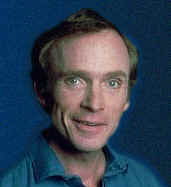 Also last Monday, November 19, but in 1936, American television talk-show host Dick Cavett was born. In 1969 he began hosting “The Dick Cavett Show,” beginning on ABC (1969-74;86-87), then moving to CBS (1975), PBS (1977-82), USA (1985-86), and CNBC (1989). As host, Cavett is always conversational, civil and intellectual, with a dry wit. His interviewing style was successful, winning Cavett 11 Emmy nominations and 3 awards. As an interview subject, Cavett once said, “This is my religious problem: it would be wonderful to believe in the most fundamental way. It would make life easier, it would explain everything, it would give meaning where none is apparent, it would make tragedies bearable. … But something about the fact that all it takes to make it so is deciding it is so puts me off. Knowing it could instantly make me much happier makes it somehow unworthy of having.” Underlining the difference between himself and his grandfather, a fundamentalist Baptist minister, Cavett also said, “…I hope there is a God for Grandpa Richards’s sake, but don’t much care if there is one for mine.”
Also last Monday, November 19, but in 1936, American television talk-show host Dick Cavett was born. In 1969 he began hosting “The Dick Cavett Show,” beginning on ABC (1969-74;86-87), then moving to CBS (1975), PBS (1977-82), USA (1985-86), and CNBC (1989). As host, Cavett is always conversational, civil and intellectual, with a dry wit. His interviewing style was successful, winning Cavett 11 Emmy nominations and 3 awards. As an interview subject, Cavett once said, “This is my religious problem: it would be wonderful to believe in the most fundamental way. It would make life easier, it would explain everything, it would give meaning where none is apparent, it would make tragedies bearable. … But something about the fact that all it takes to make it so is deciding it is so puts me off. Knowing it could instantly make me much happier makes it somehow unworthy of having.” Underlining the difference between himself and his grandfather, a fundamentalist Baptist minister, Cavett also said, “…I hope there is a God for Grandpa Richards’s sake, but don’t much care if there is one for mine.”
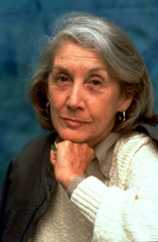 Last Tuesday, November 20, but in 1923, that South African novelist and short-story writer Nadine Gordimer was born. Gordimer was educated in a convent school and spent a year at university, but took no degree. Her first short story was published when she was fourteen. She made her reputation on novels set in South Africa and dealing with racial and moral issues in the changing social, moral, and political ravages of apartheid there. Gordimer was a founding member of Congress of South African Writers. She won the Booker Prize (1974) and the 1991 Nobel Prize in literature. In her 1991 Nobel lecture, Gordimer makes a brilliant if veiled charge, using theistic language, that writers are more powerful with their words than religions are with their dogmas. While rejecting Liberalism, her novels also offer no hope of help from God: Nadine Gordimer is an Atheist.
Last Tuesday, November 20, but in 1923, that South African novelist and short-story writer Nadine Gordimer was born. Gordimer was educated in a convent school and spent a year at university, but took no degree. Her first short story was published when she was fourteen. She made her reputation on novels set in South Africa and dealing with racial and moral issues in the changing social, moral, and political ravages of apartheid there. Gordimer was a founding member of Congress of South African Writers. She won the Booker Prize (1974) and the 1991 Nobel Prize in literature. In her 1991 Nobel lecture, Gordimer makes a brilliant if veiled charge, using theistic language, that writers are more powerful with their words than religions are with their dogmas. While rejecting Liberalism, her novels also offer no hope of help from God: Nadine Gordimer is an Atheist.
 Last Wednesday, November 21, but in 1965, Icelandic vocalist Björk Gudmundsdottir, know around the globe simply as Björk, was born. By age 11 Björk had released her first album. Her voice, music and performing persona have been described as ethereal, pixieish and alternately delicate and intense. In a 1994 HotPress article entitled “Björk on the Wild Side,” interviewer Liam Fay asks her, “Who does Björk pray to?” Björk replies, “I’ve got my own religion. … Iceland sets a world-record. The United Nations asked people from all over the world a series of questions. Iceland stuck out on one thing. When we were asked what do we believe, 90% said, ‘ourselves.’ I think I’m in that group. If I get into trouble, there’s no God or Allah to sort me out. I have to do it myself.” In a 1995 interview in the magazine Les Inrockuptibles, interviewer Neil Hannon asked, “Do you believe in God?” Björk replied, “I do not believe in religion, but if I had to choose one, it would be Buddhism. It seems more livable, closer to men.” In her DVD documentary Björk: Inside Björk, the singer admits that she once described herself as an atheist, but realized she did have a Pantheistic regard for Nature. Like many musicians and poets, she finds no inspiration in Christianity, or even in a personal god.
Last Wednesday, November 21, but in 1965, Icelandic vocalist Björk Gudmundsdottir, know around the globe simply as Björk, was born. By age 11 Björk had released her first album. Her voice, music and performing persona have been described as ethereal, pixieish and alternately delicate and intense. In a 1994 HotPress article entitled “Björk on the Wild Side,” interviewer Liam Fay asks her, “Who does Björk pray to?” Björk replies, “I’ve got my own religion. … Iceland sets a world-record. The United Nations asked people from all over the world a series of questions. Iceland stuck out on one thing. When we were asked what do we believe, 90% said, ‘ourselves.’ I think I’m in that group. If I get into trouble, there’s no God or Allah to sort me out. I have to do it myself.” In a 1995 interview in the magazine Les Inrockuptibles, interviewer Neil Hannon asked, “Do you believe in God?” Björk replied, “I do not believe in religion, but if I had to choose one, it would be Buddhism. It seems more livable, closer to men.” In her DVD documentary Björk: Inside Björk, the singer admits that she once described herself as an atheist, but realized she did have a Pantheistic regard for Nature. Like many musicians and poets, she finds no inspiration in Christianity, or even in a personal god.
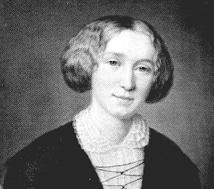 Last Thursday, November 22, but in 1819, English Victorian novelist Mary Ann Evans, who rose to fame under the pen-name “George Eliot,” was born. Her hunger for reading and learning led her to master Greek, Latin, Italian, and German after leaving school. Evans attended church, out of respect for her family, only until her father died in 1849, but concluded of Christianity, “It is time the clergy are told that thinking men, after a close examination of that doctrine, pronounce it to be subversive of true moral development and, therefore, positively noxious.” In 1844, Evans translated and published David Friedrich Strauss’s strongly skeptical Life of Jesus. After joining the staff of the Westminster Review, Evans met many brilliant Victorian writers, including George Henry Lewes, who would be her companion – his wife was mentally ill, so he could not marry – until Lewes’s death. Her extra-marital association with Lewes raised some Victorian eyebrows, even though it was his wife who bore two children by adulterous liaisons, but otherwise was salutary for her career as a writer: she adopted her pen name, George Eliot and published her most memorable works during this period: Adam Bede (1859), The Mill on the Floss (1860), Silas Marner (1861), Romola (1863), and Daniel Deronda (1876) – as well as her 1872 novel Middlemarch, which is considered her masterpiece. Eliot was an Agnostic, declaring “The old religion said ‘Heaven help us!’ Our new one, from its very lack of that faith in a heaven, will teach us all the more to help one another.” And in an essay ridiculing the work of evangelism, Eliot wrote, “Minds fettered by this doctrine no longer inquire concerning a proposition whether it is attested by sufficient evidence, but whether it accords with Scripture; they do not search for facts as such, but for facts that will bear out their doctrine. It is easy to see that this mental habit blunts not only the perception of truth, but the sense of truthfulness, and that the man whose faith drives him into fallacies treads close upon the precipice of falsehood. … So long as belief in propositions is regarded as indispensable to salvation, the pursuit of truth as such is not possible.”
Last Thursday, November 22, but in 1819, English Victorian novelist Mary Ann Evans, who rose to fame under the pen-name “George Eliot,” was born. Her hunger for reading and learning led her to master Greek, Latin, Italian, and German after leaving school. Evans attended church, out of respect for her family, only until her father died in 1849, but concluded of Christianity, “It is time the clergy are told that thinking men, after a close examination of that doctrine, pronounce it to be subversive of true moral development and, therefore, positively noxious.” In 1844, Evans translated and published David Friedrich Strauss’s strongly skeptical Life of Jesus. After joining the staff of the Westminster Review, Evans met many brilliant Victorian writers, including George Henry Lewes, who would be her companion – his wife was mentally ill, so he could not marry – until Lewes’s death. Her extra-marital association with Lewes raised some Victorian eyebrows, even though it was his wife who bore two children by adulterous liaisons, but otherwise was salutary for her career as a writer: she adopted her pen name, George Eliot and published her most memorable works during this period: Adam Bede (1859), The Mill on the Floss (1860), Silas Marner (1861), Romola (1863), and Daniel Deronda (1876) – as well as her 1872 novel Middlemarch, which is considered her masterpiece. Eliot was an Agnostic, declaring “The old religion said ‘Heaven help us!’ Our new one, from its very lack of that faith in a heaven, will teach us all the more to help one another.” And in an essay ridiculing the work of evangelism, Eliot wrote, “Minds fettered by this doctrine no longer inquire concerning a proposition whether it is attested by sufficient evidence, but whether it accords with Scripture; they do not search for facts as such, but for facts that will bear out their doctrine. It is easy to see that this mental habit blunts not only the perception of truth, but the sense of truthfulness, and that the man whose faith drives him into fallacies treads close upon the precipice of falsehood. … So long as belief in propositions is regarded as indispensable to salvation, the pursuit of truth as such is not possible.”
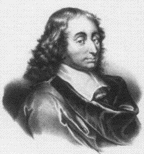 Yesterday, November 23, but in 1654, French mathematician and religious philosopher Blaise Pascal had his famous religious conversion. The story goes that on the proverbial “dark and stormy night,” while Pascal was riding in a carriage across the Neuilly bridge in the Paris suburb, a sudden fright caused the horses to bolt, sending them over the edge. Somehow, the carriage, bearing Pascal, was miraculously spared. If this was indeed the hand of God in Pascal's life, it must be admitted that it was a little hard on the horses! Pascal took the incident as a sign and on this date self-converted from mathematician and physicist to religious philosopher. That is, he left behind his useful contributions to humanity in favor of disorganized musings on religious experience and man's relationship to God that was published only after his death. That work, of course, was called Pensées or Thoughts. Curiously, Pascal told no one about his religious experience before he died. The evening of his “definite conversion” (November 23) is what Pascal described as a “night of fire.” This was the occasion of what Pascal remembered as a two-hour mystical vision, but what might just have been a misinterpretation of the aura and shimmering lights that occasionally precede a migraine headache. Some of the common triggers for migraines are being tired, stressed or depressed and the let-down after a stressful event – such as nearly falling off a bridge. Speculation? Of course. All we really know is Pascal's writings. We can only infer his mental state from reports of his chronic ill health. But if God were speaking to the unconverted through Pascal, could he not have done so without prematurely extinguishing a towering intellect?
Yesterday, November 23, but in 1654, French mathematician and religious philosopher Blaise Pascal had his famous religious conversion. The story goes that on the proverbial “dark and stormy night,” while Pascal was riding in a carriage across the Neuilly bridge in the Paris suburb, a sudden fright caused the horses to bolt, sending them over the edge. Somehow, the carriage, bearing Pascal, was miraculously spared. If this was indeed the hand of God in Pascal's life, it must be admitted that it was a little hard on the horses! Pascal took the incident as a sign and on this date self-converted from mathematician and physicist to religious philosopher. That is, he left behind his useful contributions to humanity in favor of disorganized musings on religious experience and man's relationship to God that was published only after his death. That work, of course, was called Pensées or Thoughts. Curiously, Pascal told no one about his religious experience before he died. The evening of his “definite conversion” (November 23) is what Pascal described as a “night of fire.” This was the occasion of what Pascal remembered as a two-hour mystical vision, but what might just have been a misinterpretation of the aura and shimmering lights that occasionally precede a migraine headache. Some of the common triggers for migraines are being tired, stressed or depressed and the let-down after a stressful event – such as nearly falling off a bridge. Speculation? Of course. All we really know is Pascal's writings. We can only infer his mental state from reports of his chronic ill health. But if God were speaking to the unconverted through Pascal, could he not have done so without prematurely extinguishing a towering intellect?
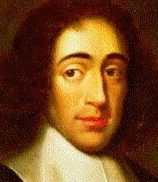 Today, November 24, but in 1632, Portuguese-Jewish philosopher Baruch Spinoza was born. His father died when he was 21, and Spinoza’s career path took a sudden turn when his open skepticism about the nature of God, the existence of angels, and the immortality of the soul prompted an attempt to silence him for “monstrous deeds” and “abominable heresies.” Failing in that, on 27 July 1656, the rabbis issued on Spinoza a writ of cherem, or excommunication – showing that Jews can be just as intolerant of Freethought as Christians. Jews were now forbidden to associate with him and, since Christians rarely associated with Jews, anyway, Spinoza was left alone. His alienation caused him to change his name from “Baruch” – in Hebrew bârûkh (ברוך שפינוזה ), meaning “blessed” – to “Benedict” – from Latin benedictus, meaning “spoken well of” or “praised” (which brings to mind a similarity to the name of the 44th President of the United States, Barack, which also means “blessed”). Spinoza had turned aside a professorship at Heidelberg University in 1670, saying, “I do not know how to teach philosophy without becoming a disturber of established religion.” Even in relatively tolerant Holland, Spinoza was persecuted. He was accused of being an Atheist, yet defended by statesman Jan de Witt, who was killed by a mob for his efforts. Spinoza’s religious ideas comprised a nuanced redefinition of God which more closely resembled Pantheism. He agreed with Descartes’ sharp distinction between matter and spirit, but claimed these as “attributes” of one being which he called God. It was Spinoza who said, “[T]he ministries of the Church are regarded by the masses merely as dignities, her offices as posts of emolument — in short, popular religion may be summed up as respect for ecclesiastics.”
Today, November 24, but in 1632, Portuguese-Jewish philosopher Baruch Spinoza was born. His father died when he was 21, and Spinoza’s career path took a sudden turn when his open skepticism about the nature of God, the existence of angels, and the immortality of the soul prompted an attempt to silence him for “monstrous deeds” and “abominable heresies.” Failing in that, on 27 July 1656, the rabbis issued on Spinoza a writ of cherem, or excommunication – showing that Jews can be just as intolerant of Freethought as Christians. Jews were now forbidden to associate with him and, since Christians rarely associated with Jews, anyway, Spinoza was left alone. His alienation caused him to change his name from “Baruch” – in Hebrew bârûkh (ברוך שפינוזה ), meaning “blessed” – to “Benedict” – from Latin benedictus, meaning “spoken well of” or “praised” (which brings to mind a similarity to the name of the 44th President of the United States, Barack, which also means “blessed”). Spinoza had turned aside a professorship at Heidelberg University in 1670, saying, “I do not know how to teach philosophy without becoming a disturber of established religion.” Even in relatively tolerant Holland, Spinoza was persecuted. He was accused of being an Atheist, yet defended by statesman Jan de Witt, who was killed by a mob for his efforts. Spinoza’s religious ideas comprised a nuanced redefinition of God which more closely resembled Pantheism. He agreed with Descartes’ sharp distinction between matter and spirit, but claimed these as “attributes” of one being which he called God. It was Spinoza who said, “[T]he ministries of the Church are regarded by the masses merely as dignities, her offices as posts of emolument — in short, popular religion may be summed up as respect for ecclesiastics.”
Other dates of note this week—
November 18: French writer and philosopher Pierre Bayle (1647)
November 19: American media mogul and philanthropist Ted Turner (1938)
November 19: Award-winning American broadcaster Larry King (1933)
November 20: Finnish philosopher and sociologist Edward (Edvard) Alexander Westermarck (1862)
November 21: French writer François-Marie Arouet, who became famous as Voltaire (1694)
November 23: Freethought Almanac blogger Ronald Bruce Meyer (1954)
We can look back, but the Golden Age of Freethought is now. You can find full versions of these pages in Freethought history at the links in my blog, FreethoughtAlmanac.com.

